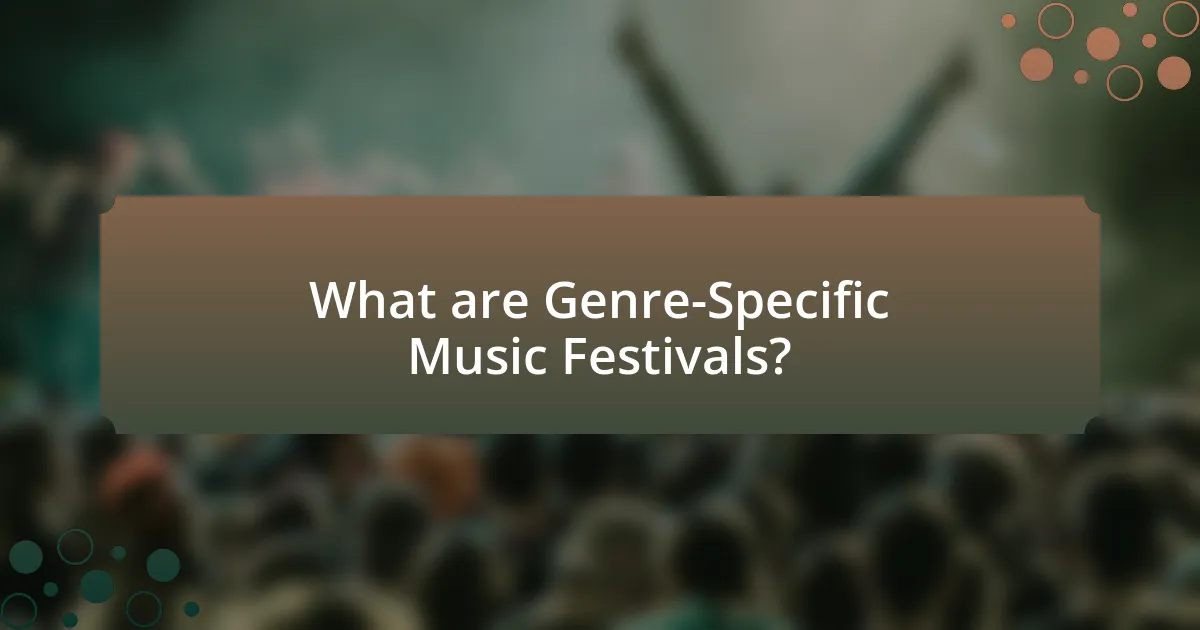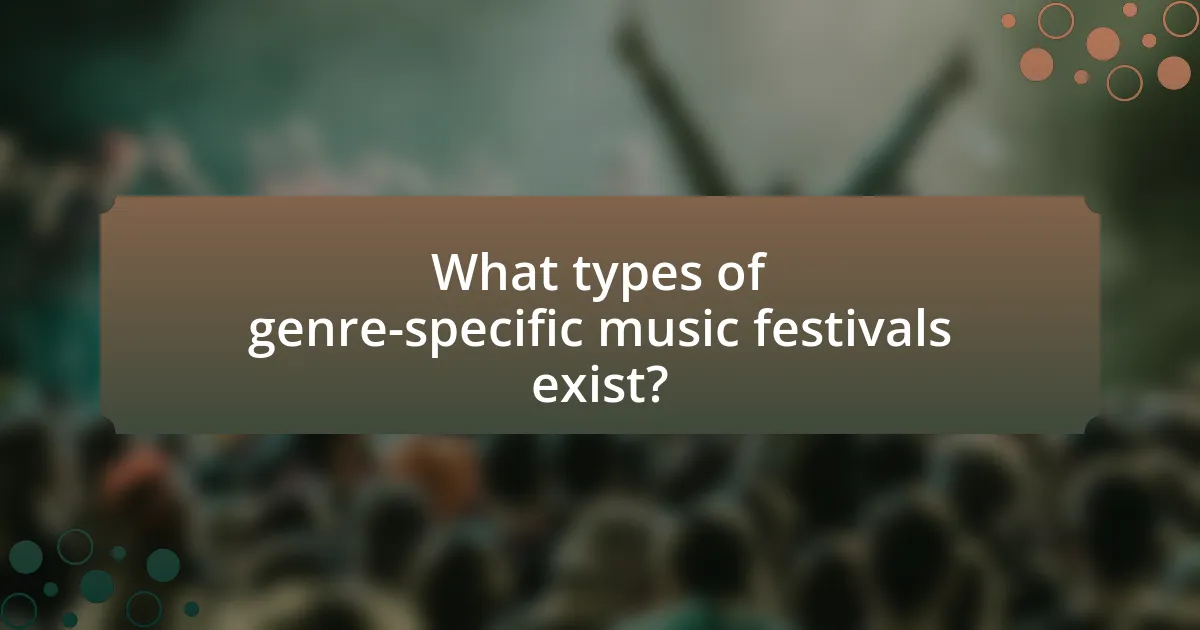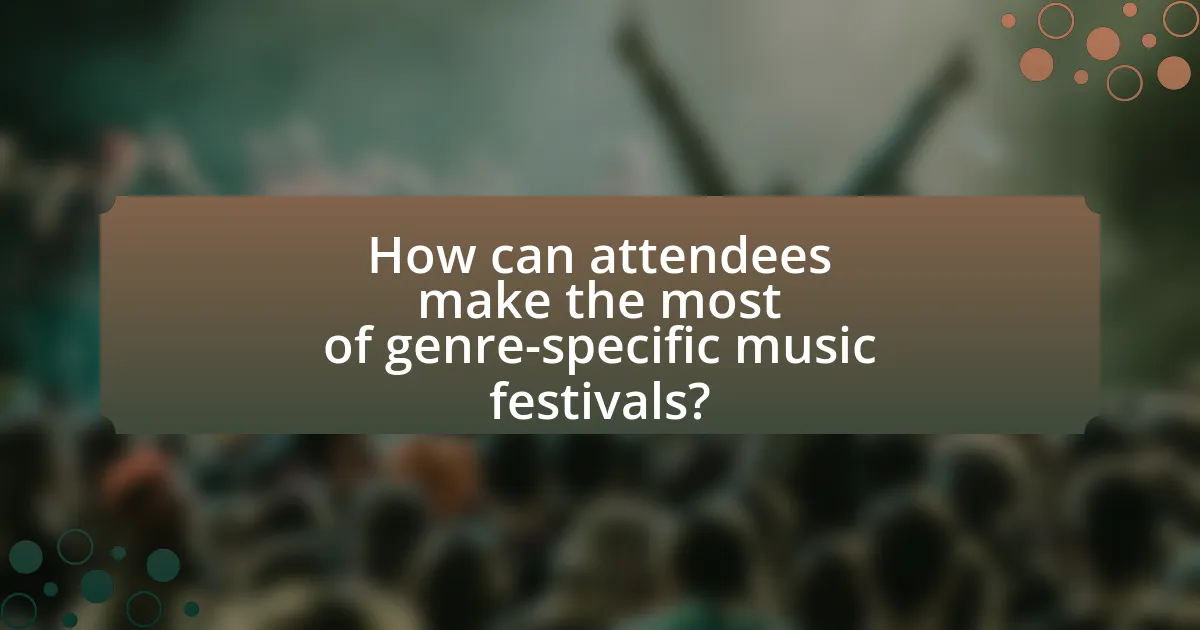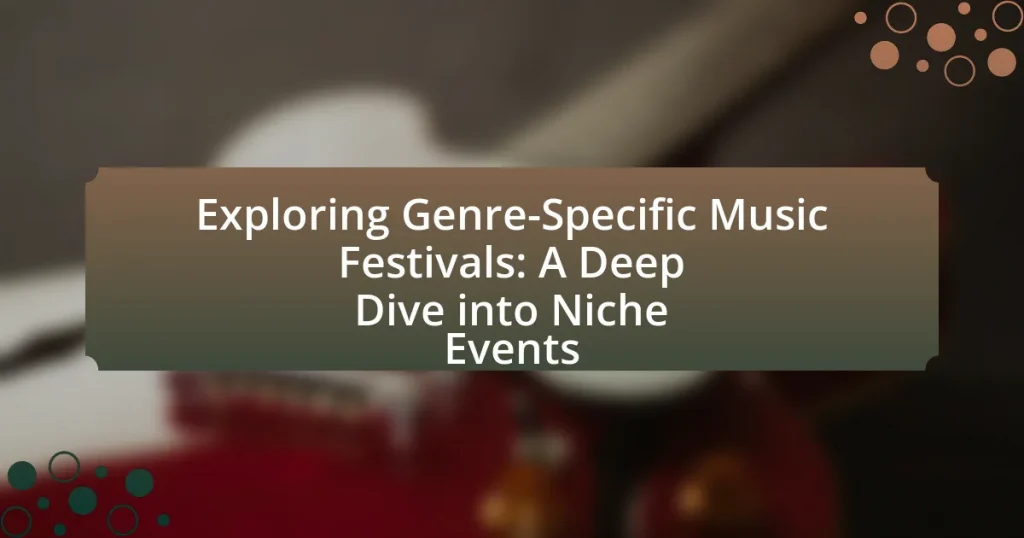Genre-specific music festivals are events that focus on particular music genres, creating immersive experiences for artists and fans alike. This article explores the characteristics, differences, and unique offerings of these niche festivals compared to mainstream events. It examines how genre-specific festivals cater to dedicated audiences, the cultural trends driving their popularity, and the impact of social media on attendance. Additionally, it highlights various types of genre-specific festivals, notable examples, and best practices for attendees to enhance their experience while discovering new artists and genres.

What are Genre-Specific Music Festivals?
Genre-specific music festivals are events that focus on a particular genre of music, bringing together artists and fans who share a common interest in that style. These festivals often feature a lineup of performers exclusively from the designated genre, such as rock, jazz, electronic, or country, creating an immersive experience for attendees. For example, the Coachella Valley Music and Arts Festival showcases a diverse range of genres, while events like the New Orleans Jazz & Heritage Festival specifically highlight jazz and related music styles. This specialization allows for a deeper connection among participants and enhances the overall atmosphere of the festival.
How do genre-specific music festivals differ from mainstream festivals?
Genre-specific music festivals focus on a particular musical genre, while mainstream festivals feature a diverse range of genres. This specialization allows genre-specific festivals to curate lineups that attract dedicated fans, enhancing the overall experience through targeted programming. For example, festivals like Coachella showcase multiple genres, appealing to a broader audience, whereas events like the Electric Daisy Carnival concentrate solely on electronic dance music, creating a more immersive environment for fans of that genre. The distinct audience engagement and tailored experiences at genre-specific festivals often lead to stronger community bonds among attendees, as they share a common passion for the specific music style.
What unique experiences do niche music festivals offer attendees?
Niche music festivals offer attendees immersive experiences tailored to specific genres, creating a deep connection between the audience and the music. These festivals often feature curated lineups that showcase emerging and established artists within a particular genre, allowing attendees to discover new talent and enjoy performances that resonate with their musical preferences. For example, the Electric Forest Festival focuses on electronic and jam band music, providing a unique blend of art installations and interactive experiences that enhance the overall atmosphere. Additionally, niche festivals often foster a sense of community among attendees who share similar musical tastes, leading to a more intimate and engaging environment compared to larger, mainstream festivals. This community aspect is supported by activities such as workshops, discussions, and themed events that encourage interaction and participation, further enriching the attendee experience.
How do genre-specific festivals cater to their target audiences?
Genre-specific festivals cater to their target audiences by curating experiences that align with the preferences and interests of specific music genres. These festivals often feature lineups that include popular and emerging artists within the genre, ensuring that attendees connect with familiar sounds and styles. For example, electronic music festivals like Tomorrowland focus on electronic dance music, attracting fans who seek immersive experiences through elaborate stage designs and visual effects that resonate with the genre’s culture. Additionally, genre-specific festivals often incorporate themed activities, workshops, and merchandise that reflect the genre’s ethos, further enhancing the audience’s engagement and satisfaction. This targeted approach is supported by industry research indicating that niche festivals can attract dedicated fan bases, leading to higher attendance and loyalty among participants.
Why are genre-specific music festivals gaining popularity?
Genre-specific music festivals are gaining popularity due to their ability to create immersive experiences tailored to specific musical tastes. These festivals attract dedicated fan bases who seek a deeper connection with the genre, enhancing community engagement and fostering a sense of belonging among attendees. For instance, events like Coachella and Lollapalooza have expanded to include genre-specific stages, reflecting the demand for niche experiences. Additionally, the rise of social media has facilitated the promotion of these festivals, allowing fans to share their experiences and connect with like-minded individuals, further driving interest and attendance.
What cultural trends contribute to the rise of niche music festivals?
The rise of niche music festivals is primarily driven by the increasing demand for personalized and immersive experiences among audiences. This trend reflects a broader cultural shift towards individualism and the desire for community among like-minded individuals. For instance, niche festivals often cater to specific genres or subcultures, such as electronic dance music or folk, allowing attendees to connect deeply with both the music and fellow fans. Additionally, the growth of social media platforms has facilitated the promotion and discovery of these specialized events, enabling smaller festivals to reach targeted audiences effectively. According to a report by Eventbrite, 78% of millennials prefer attending unique experiences over traditional entertainment, highlighting the cultural preference for niche offerings.
How do social media and marketing influence festival attendance?
Social media and marketing significantly influence festival attendance by enhancing visibility and engagement among potential attendees. Platforms like Instagram and Facebook allow festivals to showcase their lineups, share user-generated content, and create buzz through targeted advertising. For instance, a study by Eventbrite found that 95% of festival-goers discover events through social media, highlighting its critical role in driving attendance. Additionally, effective marketing strategies, such as early bird ticket promotions and influencer partnerships, can create a sense of urgency and exclusivity, further boosting ticket sales.

What types of genre-specific music festivals exist?
Genre-specific music festivals include a variety of types such as rock festivals, electronic dance music (EDM) festivals, jazz festivals, country music festivals, hip-hop festivals, and folk music festivals. Each type focuses on a specific genre, attracting fans and artists associated with that genre. For example, the Coachella Valley Music and Arts Festival primarily features rock and pop artists, while Tomorrowland is renowned for its electronic dance music lineup. These festivals often showcase a range of sub-genres and provide a platform for both established and emerging artists within their respective genres.
How do different genres shape the festival experience?
Different genres significantly shape the festival experience by influencing the atmosphere, audience demographics, and overall engagement. For instance, electronic dance music festivals often create immersive environments with elaborate light shows and interactive installations, attracting a younger, energetic crowd that seeks a communal experience. In contrast, folk music festivals typically foster a more laid-back atmosphere, appealing to diverse age groups and encouraging storytelling and connection through acoustic performances. Research indicates that genre-specific festivals can enhance attendee satisfaction by aligning musical preferences with social interactions, as seen in studies like “The Role of Music Genres in Shaping Festival Experiences” published in the Journal of Cultural Economics. This alignment not only enhances enjoyment but also cultivates a sense of belonging among attendees, reinforcing the impact of genre on the festival experience.
What are the key characteristics of electronic music festivals?
Electronic music festivals are characterized by their immersive audio-visual experiences, diverse lineups of electronic music genres, and vibrant community atmosphere. These festivals typically feature multiple stages showcasing various sub-genres such as house, techno, and trance, allowing attendees to explore a wide range of musical styles. Additionally, they often incorporate elaborate stage designs, light shows, and visual art installations that enhance the sensory experience. The communal aspect is emphasized through social interactions, shared experiences, and a culture of inclusivity among attendees, which is often reflected in the festival’s branding and marketing strategies. Events like Tomorrowland and Electric Daisy Carnival exemplify these characteristics, drawing large crowds and creating a unique festival culture centered around electronic music.
How do folk music festivals create a sense of community?
Folk music festivals create a sense of community by bringing together individuals who share a common appreciation for folk music and cultural traditions. These festivals often feature local artists and musicians, fostering connections among attendees through shared experiences and collective participation in music and dance. Research indicates that such gatherings enhance social bonds, as participants engage in communal activities like singing, storytelling, and workshops, which promote interaction and collaboration. For example, a study by the University of California found that music festivals significantly increase social cohesion among attendees, as they provide a platform for cultural exchange and collective identity formation.
What are some notable examples of genre-specific music festivals?
Notable examples of genre-specific music festivals include Coachella, which focuses on a diverse range of genres including rock, pop, and electronic; Lollapalooza, known for alternative rock and hip-hop; and Tomorrowland, which is dedicated to electronic dance music. Additionally, the Newport Folk Festival emphasizes folk music, while the CMA Fest is centered around country music. These festivals attract large audiences and feature prominent artists within their respective genres, showcasing the diversity and specialization within the music festival landscape.
Which festivals are considered the best in the electronic genre?
The best festivals in the electronic genre include Tomorrowland, Ultra Music Festival, and Electric Daisy Carnival. Tomorrowland, held in Belgium, is renowned for its elaborate stage designs and top-tier lineups, attracting over 400,000 attendees annually. Ultra Music Festival, based in Miami, is a pivotal event in the electronic music calendar, featuring major artists and drawing around 165,000 fans each year. Electric Daisy Carnival, primarily in Las Vegas, is famous for its vibrant atmosphere and immersive experiences, with attendance exceeding 400,000. These festivals are consistently recognized for their impact on the electronic music scene and their ability to showcase leading artists and innovative performances.
What makes bluegrass festivals unique compared to other genres?
Bluegrass festivals are unique due to their emphasis on acoustic instrumentation, community participation, and traditional roots. Unlike many other music genres that may rely heavily on electronic elements, bluegrass showcases instruments such as the banjo, mandolin, fiddle, and upright bass, creating a distinct sound that is both lively and harmonious. Additionally, bluegrass festivals often encourage audience interaction through jam sessions, where attendees can join in and play alongside professional musicians, fostering a sense of community and inclusivity. Historically, bluegrass music has deep ties to American folk traditions, which are celebrated at these festivals through workshops, storytelling, and cultural exchanges, further distinguishing them from other genre festivals that may focus primarily on performance.

How can attendees make the most of genre-specific music festivals?
Attendees can make the most of genre-specific music festivals by thoroughly researching the lineup and schedule in advance. This preparation allows attendees to prioritize must-see artists and plan their day effectively, ensuring they do not miss key performances. For instance, festivals often feature multiple stages and overlapping sets, making it crucial to have a clear plan. Additionally, engaging with the festival community through social media or forums can provide insights into hidden gems and tips from previous attendees, enhancing the overall experience. According to a survey by Eventbrite, 78% of festival-goers reported that planning ahead significantly improved their enjoyment, highlighting the importance of preparation in maximizing the festival experience.
What tips should festival-goers consider before attending?
Festival-goers should consider planning their itinerary in advance to maximize their experience. This includes researching the festival schedule, identifying key performances, and understanding the layout of the venue. According to a survey by Eventbrite, 70% of attendees reported that having a plan helped them enjoy the festival more fully. Additionally, festival-goers should prepare for varying weather conditions by checking forecasts and dressing appropriately, as many festivals occur outdoors and can last several hours. Staying hydrated and bringing necessary supplies, such as sunscreen and portable chargers, is also crucial for comfort and safety during the event.
How can attendees prepare for the specific environment of niche festivals?
Attendees can prepare for the specific environment of niche festivals by researching the festival’s unique culture, lineup, and location. Understanding the festival’s genre and community helps attendees align their expectations and attire with the event’s vibe. For example, attendees of a folk music festival may opt for casual, comfortable clothing suitable for outdoor settings, while those attending an electronic music festival might choose vibrant, expressive outfits. Additionally, familiarizing oneself with the festival’s schedule and layout allows for efficient planning of performances to attend, ensuring a fulfilling experience. According to a study by the University of California, attendees who engage in pre-festival research report higher satisfaction levels, as they feel more connected to the event’s atmosphere and community.
What should attendees know about festival etiquette and community engagement?
Attendees should know that festival etiquette includes respecting personal space, being mindful of noise levels, and following the event’s rules. Respecting personal space is crucial as crowded environments can lead to discomfort; maintaining a respectful distance helps ensure everyone enjoys the experience. Mindfulness of noise levels is important, especially in intimate settings, as excessive noise can disrupt performances and the enjoyment of others. Following the event’s rules, such as designated areas for smoking or drinking, contributes to a safe and enjoyable atmosphere for all participants. Community engagement involves actively participating in festival activities, supporting local vendors, and being open to interactions with fellow attendees, which fosters a sense of belonging and enhances the overall festival experience.
What are the best practices for enjoying genre-specific music festivals?
To enjoy genre-specific music festivals, attendees should research the lineup and schedule in advance to prioritize performances of interest. This preparation allows festival-goers to create a personalized itinerary, ensuring they do not miss key acts. Additionally, understanding the festival’s culture and community enhances the experience, as many genre-specific festivals foster unique atmospheres and interactions among fans. For instance, electronic dance music festivals often emphasize vibrant visuals and immersive experiences, while folk festivals may focus on storytelling and acoustic performances. Engaging with fellow attendees and participating in festival activities, such as workshops or discussions, can further enrich the experience. Statistics show that attendees who actively participate in festival activities report higher satisfaction levels, highlighting the importance of engagement in enhancing enjoyment.
How can attendees discover new artists and genres at these festivals?
Attendees can discover new artists and genres at these festivals through curated lineups, interactive workshops, and artist showcases. Curated lineups often feature a mix of established and emerging artists, allowing attendees to experience diverse sounds and styles. Interactive workshops provide opportunities for attendees to engage with artists directly, fostering a deeper understanding of different genres. Additionally, artist showcases highlight lesser-known performers, giving them a platform to reach new audiences. These elements collectively enhance the festival experience and facilitate the discovery of new musical talent.
What strategies can enhance the overall festival experience?
To enhance the overall festival experience, organizers should implement strategies such as improving accessibility, offering diverse programming, and ensuring effective communication. Accessibility can be improved by providing transportation options, clear signage, and facilities for individuals with disabilities, which studies show increases attendance and satisfaction. Diverse programming, including various genres and activities, caters to a wider audience, as evidenced by festivals like Coachella, which features multiple genres to attract different demographics. Effective communication through social media and mobile apps keeps attendees informed about schedules, changes, and safety protocols, enhancing their engagement and overall experience.
